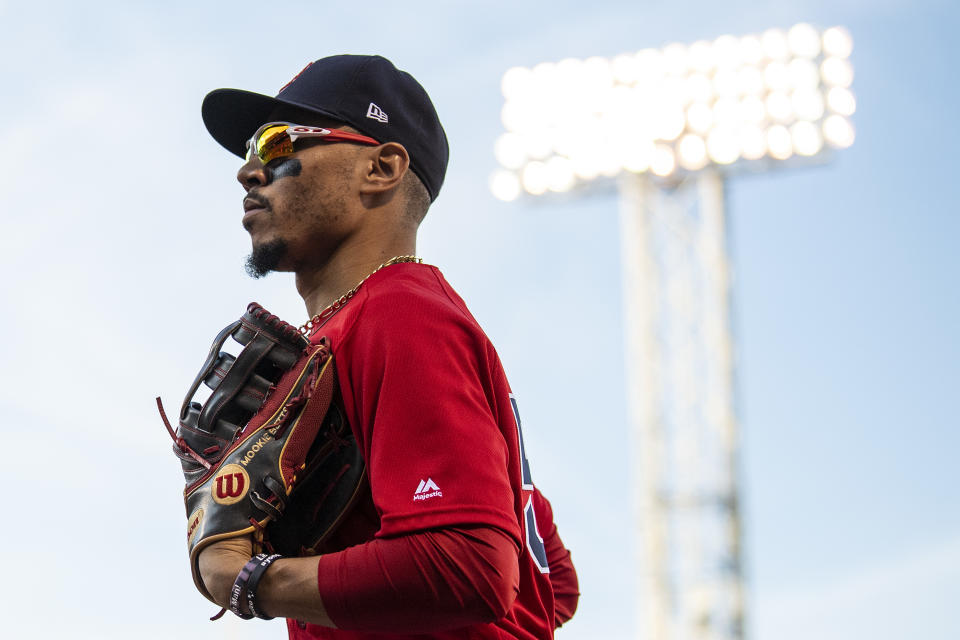Fantasy Spin on Betts trade between Dodgers-Red Sox: Hooray for Mookiewood

It’s a pretty good time to be a Los Angeles Dodgers fan. Your team has seven straight NL West titles and is coming off a 106-win season. Now, it adds one of the five best baseball players in the world.
The cost? Some salary absorption and a collection of good, not elite, players.
Last decade, we saw Mannywood. Coming for 2020, it’s Mookiewood.
Mookie Betts is now a Los Angeles Dodger
The meandering Mookie Betts trade talks finally reached completion on Tuesday, pending physical exams. The Dodgers added Betts and David Price. In deals involving three teams, they dispatched Alex Verdugo, Kenta Maeda, Ross Stripling, and Joc Pederson.
You can’t find a flaw in Mookie’s game — he’s good at everything. His career slash of .301/.374/.519 speaks for itself. He’s an elite defender, sitting on four straight Gold Gloves. He’s been an MVP factor four straight years, winning in 2018 and coming in second in 2016.
Mike Trout is generally accepted as baseball’s best player. Betts, stepping into his age-27 season, could be No. 2.
[Batter up: Join or create a Yahoo Fantasy Baseball league for free today]
Betts had a modest home tilt to his Boston stats, but the Dodgers lineup offers buoyancy, too. The Dodgers were only 15 runs behind Boston last year, and that’s without the DH. Now they add Betts, presumably to the leadoff spot.
Betts was already a lottery pick in fantasy drafts, and that’s where he’ll stay. You’ll need a Top 6 pick to land him in most pools, and he might land No. 2 or No. 3 in some leagues. He’s the best bet to lead the majors in runs scored. Mookie’s steal total could be anything from 10-to-30; he’s always been a high-percentage thief, it’s just a matter of when it’s worth the bother. The Red Sox and Dodgers both eschewed the steal last year.
Price also comes to Chavez Ravine, a big reason why Boston was incentivized to make this trade; the teams will share Price’s hefty salary forward. Injuries and reduced velocity kept Price down at times during his stormy Boston days (3.84 ERA, 1.20 WHIP), though he had moments of brilliance (the 2018 playoffs come to mind). Perhaps he can be a profit guy this year, pitching in a less-antagonistic media market and for a team that will be careful with his workload. He won’t miss the DH, either.
Verdugo steps into the Boston outfield, looking to build on a .294/.342/.475 rookie season. Boston would be happy if he repeated that slash. Verdugo hit 12 homers in 106 games and played solid defense. Fenway Park is an offensive gift and can especially be a LHB’s best friend if he’s willing to use the entire yard.
Verdugo battled oblique and back injuries late last year; we’ll keep an eye on that in the spring. He’s an interesting target for the teen rounds. Keep in mind Verdugo was a Top-50 prospect before he became a big-league regular; there’s some pedigree here.
The Twins and Angels were involved, too
Right-handed pitcher Brusdar Graterol is Boston’s other piece, coming from Minnesota (the Twins scooped Maeda for their trouble). Graterol has a powerful if erratic arm, and could be one pitch short of a rotation future. But even if his floor is shutdown reliever, the 2020 Red Sox will find a key role for him. He’s 21.
Before you crush the Red Sox too much for the card they played, ask yourself what the alternatives were. Joe Sheehan, a friend of mine and one of the best baseball writers around, made a key point in his Wednesday newsletter, a point that’s been missed by too many people.
"Just for 2020, this trade doesn’t make the Red Sox a lot worse. It makes them a little worse, albeit in a range where the marginal wins they’re giving up affect their wild-card chances. It caps their ceiling while saving them perhaps $60 million in salary and tax payments, as well as resetting their penalty structure in future years. The Red Sox only traded 2020 Mookie Betts; they didn’t have the 2021-2028 version. Evaluating this trade as if they did, as if employing that version was simply a matter of choice, is an error."
Maeda, one of the cast of thousands in LA, heads to Minnesota, where he’ll likely slot in as their No. 4 starter. The trip to the jagged AL gets mitigated by the Central Division; Detroit and Kansas City offer soft landings. It probably hashes out to a lateral move. Minnesota is still the prohibitive favorite in the division.
The Dodgers also shipped Joc Pederson and Ross Stripling to the Angels; the curse of having too many good players (and needing to trim a little from the balance sheet). Pederson is a clear platoon guy but at least it’s the good side; he could conk another 25 homers, maybe become the semi-regular leadoff man. Stripling has a curveball to die for, and becomes one of those trendy sleepers that will feel obvious by the Ides of March. Like Maeda, it’s fair to question Stripling’s durability. But if he can make even 20 starts this year, I’m plenty interested.
